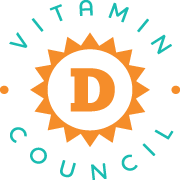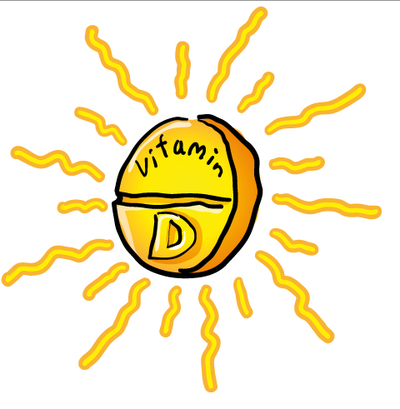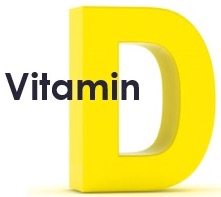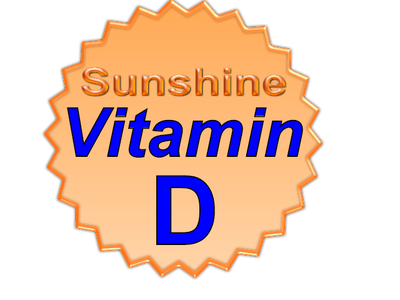What is Vitamin D? |
|
Vitamin D is actually a hormone. The word “vitamin” generally applies to substances that our body can’t make, but need, so we must get it from our food. Vitamin D is instead, a hormone that we make naturally in our skin from exposure to the sun's UVB rays. It is a hormone similar to estrogen or testosterone. It is called "The Sunshine Vitamin", but more accurately would be called "The Sunshine Hormone". Vitamin D is made in the skin, absorbed into the bloodstream, and then travels to the liver and kidneys where it is converted to its biologically active form.
Why Do We Need Vitamin D?
Vitamin D is necessary in nearly all body processes. Vitamin D receptors are present in virtually every tissue and cell in your body, and adequate Vitamin D level is essential for optimal functioning of these tissues and cells. While best known for roles in maintaining bone health and the immune system, below is a list of some of the other Vitamin D functions. See also the various areas under the Research section of the menu.
Inflammation – Vitamin D activates receptors that signal inflammation reduction.
Cell differentiation – Vitamin D regulates the proliferation and specialization of cells.
Cognition – Vitamin D helps maintain cognitive function and is importance of brain health.
Immune system – Vitamin D plays a role in antimicrobial response by disrupting bacterial cell membranes, and boosts the immune system to fight of viruses, such as the Coronavirus.
Autoimmune function – Vitamin D inhibits B cell proliferation and differentiation, preventing antigens from maturing so tolerance to self is maintained
Cancer – More than 200 epidemiological studies link Vitamin D deficiency to breast and other forms of cancer
Infection – Vitamin D produces 200 anti-microbial peptides, including a naturally occurring broad spectrum antibiotic
Gene activity – Vitamin D regulates 3,000 of our 24,000 genes
Weight and appetite – Vitamin D levels influence weight and appetite signaling. At the primal level, high Vitamin D levels indicate summer, a time of abundant food and building the body’s strength. We store less and sleep less but more efficiently. Low Vitamin D levels signal us to sleep more and store fat for spring
The colonic biome – Vitamin D levels affect populations of bacteria in our intestines and affect the entire GI tract
Do Birds AND BEES NEED D?
Every animal on this planet; mammals, reptiles, birds, fish and insects need and use this same chemical, D3 (cholecalciferol), made on their skin from exposure to UVB light.
What is the Impact of Deficiency?
Low levels of Vitamin D are associated with inflammation, poor sleep, memory loss, depression, hypertension, stroke, heart disease, anemia, cancer, balance difficulties, pain, infertility, polycystic ovary syndrome, endometriosis, and a host of other ailments. Vitamin D levels, like calcium levels, must be maintained at sufficient levels in the blood serum. If homeostasis is not achieved, the body will draw it from the bones or elsewhere in the body.
Who is at Risk of Not Getting Enough?
All People who have, are, or do any of the following are at high risk of being Vitamin D deficient:
- Do not get out in the sun for more than 15 minutes every day
- Have naturally darker skin
- Are older and cannot assimilate well through digestion
- Live in colder climates or the northern hemisphere
- Work indoors
- Are Homebound or spend majority of time indoors
- Wear clothes covering most of their body and head coverings
- Vegans, as natural food sources of Vitamin D are animal based
- Overweight
- Crohn’s disease
- Cystic Fibrosis
- Celiac disease
How Does the Body Regulate Vitamin D Levels?
If you get more than adequate Vitamin D from sunlight, the body has mechanisms to self-regulate Vitamin D levels, and to prevent an excess of vitamin D from developing:
Note that these mechanisms regulate Vitamin D in the skin. They are not available to regulate Vitamin D taken orally.
- Sun exposure converts excess vitamin D in the skin to a variety of inactive metabolites.
- The pigment melanin in skin, produced by sun exposure, decreases the production of vitamin D.
- The skin regulates absorption of nutrients and minerals depending on existing levels in the body.
Note that these mechanisms regulate Vitamin D in the skin. They are not available to regulate Vitamin D taken orally.
Links to More Info on Vitamin D
The Pictures below contain links to additional information about "The Sunshine Vitamin".






